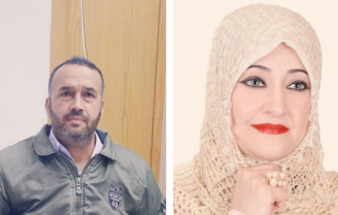-
Why Syria is so unprepared for COVID

How does a authoritarian police state almost a decade into the most devastating civil strife in its history cope with a deadly pandemic that has put the world on its knees? Not very well is the answer but in its own unique way and filtered through its own unique disfunction.
The good news for Syria earlier on in the year was that unlike New York or London, it wasn’t home to a global transport hub and wasn’t seeing a large-scale entry of infections through its borders. The perverse advantage of being one of the most dangerous countries on the planet meant that with people staying away, so did COVID.
Yet such is the infectious nature of a disease that we now know can be transmitted via aerosol infection, that it was only a matter of time for COVID to come knocking on the doors of the war weary country. The first official case was reported on March 22nd and today Syria faces the perfect storm of regional economic collapse, prolonged and continuing conflict and now COVID.
In the US when the country reached the grim milestone of 50,000 dead the New York Times published a frontpage with as many of their faces as possible. In Syria the dead have no such access to status and recognition. Nobody knows how many have died in the war to date, nobody knows how many died in the country’s notorious prisons. In a country where death is such a secretive and unknown affair, why expect any difference in the approach to COVID?
Recent reports of the virus beginning to spike in the country are founded on a triangulation of available data rather than via a transparent and effective public health reporting system. Of course, the presence of the virus in the country is very much filtered through the lens of who controls that particular part with very difference scenarios emerging in the northwest and the northeast from the rest of the country.
In Regime controlled Syria current testing levels, a crucial tool in the armoury of a pandemic response, are pitifully low. Indeed, current testing at 907 tests per million people puts Syria in 7th from last place globally, just behind Mali. With testing levels so low it is almost impossible to track symptomatic cases let alone the large numbers of display no symptoms.
As countries like the UK discovered, if you lose sight of the rate in which the virus is increasing through testing, then you start to see it instead at the more critical level of emergency health care. Reports are beginning to emerge of a trait that was seen in early affected countries like China and Italy; medics dying.
Seven medics have reportedly died of the virus in the last two weeks, and whilst official tallies show Syria at only 46 deaths from the virus, obituaries increasingly reveal the true scale of crisis. A similar attempt to repress the real cost of the virus is seen to the east in Syria’s close ally Iran. The number of deaths from coronavirus in Iran is nearly triple what Iran's government claims, a BBC Persian service investigation has found. The government's own records appear to show almost 42,000 people died with Covid-19 symptoms up to 20 July, versus 14,405 reported by its health ministry.
The Regime’s secretive approach to rule is an anathema to the transparency and public information required to collectively conquer a virus like COVID-19. Instead their preference has been for demonstrative policies, such as the widespread disinfecting of neighbourhoods in Damascus from the start of the week. Yet we shouldn’t confuse action from being effective and without an approach to locking down, social distancing, adequate protective equipment and of course tracking and testing then the exponential increase of the virus is likely to continue as it has elsewhere.
Such is the urgency around the virus taking hold in the country that even the Syrian Ministry of Health is now warning of the need for "extreme caution", which is probably as critical as they can be before people start going missing.
Nabough al-Awa, dean of the medical school in the Damascus University, has said that all rooms in government-run hospitals are full and new arrivals in critical condition have no immediate access to intensive care units. When patients can’t access full hospitals the health care system of a country is officially overwhelmed, and mortality numbers start to leap up in ways that even the Regime may struggle to repress.

by : jamse danselow
Tags
You May Also Like
Popular Posts
Caricature
BENEFIT AGM approves 10%...
- March 27, 2025
BENEFIT, the Kingdom’s innovator and leading company in Fintech and electronic financial transactions service, held its Annual General Meeting (AGM) at the company’s headquarters in the Seef District.
During the meeting, shareholders approved all items listed on the agenda, including the ratification of the minutes of the previous AGM held on 26 March 2024. The session reviewed and approved the Board’s Annual Report on the company’s activities and financial performance for the fiscal year ended 31 December 2024, and the shareholders expressed their satisfaction with the company’s operational and financial results during the reporting period.
The meeting also reviewed the Independent External Auditor’s Report on the company’s consolidated financial statements for the year ended 31 December 2024. Subsequently, the shareholders approved the audited financial statements for the fiscal year. Based on the Board’s recommendation, the shareholders approved the distribution of a cash dividend equivalent to 10% of the paid-up share capital.
Furthermore, the shareholders endorsed the allocation of a total amount of BD 172,500 as remuneration to the members of the Board for the year ended 31 December 2024, subject to prior clearance by related authorities.
The extension of the current composition of the Board was approved, which includes ten members and one CBB observer, for a further six-month term, expiring in September 2025, pending no objection from the CBB.
The meeting reviewed and approved the Corporate Governance Report for 2024, which affirmed the company’s full compliance with the corporate governance directives issued by the CBB and other applicable regulatory frameworks. The AGM absolved the Board Members of liability for any of their actions during the year ending on 31st December 2024, in accordance with the Commercial Companies Law.
In alignment with regulatory requirements, the session approved the reappointment of Ernst & Young (EY) as the company’s External Auditors for the fiscal year 2025, covering both the parent company and its subsidiaries—Sinnad and Bahrain FinTech Bay. The Board was authorised to determine the external auditors’ professional fees, subject to approval from the CBB, and the meeting concluded with a discussion of any additional issues as per Article (207) of the Commercial Companies Law.
Speaking on the company’s performance, Mr. Mohamed Al Bastaki, Chairman BENEFIT , stated: “In terms of the financial results for 2024, I am pleased to say that the year gone by has also been proved to be a success in delivering tangible results. Growth rate for 2024 was 19 per cent. Revenue for the year was BD 17 M (US$ 45.3 Million) and net profit was 2 Million ($ 5.3 Million).
Mr. Al Bastaki also announced that the Board had formally adopted a new three-year strategic roadmap to commence in 2025. The strategy encompasses a phased international expansion, optimisation of internal operations, enhanced revenue diversification, long-term sustainability initiatives, and the advancement of innovation and digital transformation initiatives across all service lines.
“I extend my sincere appreciation to the CBB for its continued support of BENEFIT and its pivotal role in fostering a stable and progressive regulatory environment for the Kingdom’s banking and financial sector—an environment that has significantly reinforced Bahrain’s standing as a leading financial hub in the region,” said Mr. Al Bastaki. “I would also like to thank our partner banks and valued customers for their trust, and our shareholders for their ongoing encouragement. The achievements of 2024 set a strong precedent, and I am confident they will serve as a foundation for yet another successful and impactful year ahead.”
Chief Executive of BENEFIT; Mr. Abdulwahed AlJanahi commented, “The year 2024 represented another pivotal chapter in BENEFIT ’s evolution. We achieved substantial progress in advancing our digital strategy across multiple sectors, while reinforcing our long-term commitment to the development of Bahrain’s financial services and payments landscape. Throughout the year, we remained firmly aligned with our objective of delivering measurable value to our shareholders, strategic partners, and customers. At the same time, we continued to play an active role in enabling Bahrain’s digital economy by introducing innovative solutions and service enhancements that directly address market needs and future opportunities.”
Mr. AlJanahi affirmed that BENEFIT has successfully developed a robust and well-integrated payment network that connects individuals and businesses across Bahrain, accelerating the adoption of emerging technologies in the banking and financial services sector and reinforcing Bahrain’s position as a growing fintech hub, and added, “Our achievements of the past year reflect a long-term vision to establish a resilient electronic payment infrastructure that supports the Kingdom’s digital economy. Key developments in 2024 included the implementation of central authentication for open banking via BENEFIT Pay”
Mr. AlJanahi concluded by thanking the Board for its strategic direction, the company’s staff for their continued dedication, and the Central Bank of Bahrain, member banks, and shareholders for their valuable partnership and confidence in the company’s long-term vision.
opinion
Report
ads
Newsletter
Subscribe to our mailing list to get the new updates!






















